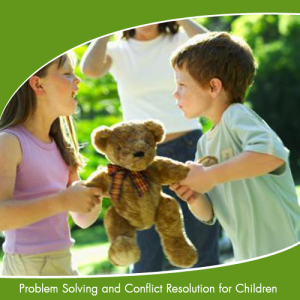As a parent how did you learn to resolve conflicts? Doubtlessly, your biggest influencers were your parents. You learnt your early lessons from them and unknowingly emulated their responses and attitudes when resolving conflict. Now, these are a part of your psyche and intellect more than you would ever want to admit.
Conflict resolution is not like math. It is an art that needs to be experienced, interpreted and learnt in our own unique way. When it comes to children, it is best to let them resolve conflict in their own way, albeit, with a little support from you. Here are a few guidelines that will slowly, but surely help you and your child learn conflict resolution at every level, whether it is for a very young child or an older child.
- Let them resolve conflicts. Don’t do it for them
It is challenging for any parent to hold back when a child is trying to snatch a toy from another child. After all, you want to instil the spirit of sharing early on, right? Well, this may not be the right way to do it. It is easy to swoop in and demand that your child share the toy or even take sides in your attempt to dissolve undesired situations that result in crying and heartbreak.
But intervention at this stage can prevent the child from learning it to resolve it in his own way. He will always look to you for support (if you support him) and look away from you (if you take the other child’s side). Both are equally damaging.
Next time you are faced with a similar scenario, try this:
If your child cries for a toy that is with another child, express empathy. “I know you are upset that you can’t play with the teddy now”. At the same time, offer choices to resolve the conflict. “Do you want to ask Amy if she can share it the teddy with you for some time?”
- Provide safe environment for conflict resolution
If a conflict resolution scenario is getting out of hand and you suspect it will result in a physical battle, it is okay to physically remove your child from the scene and explain that hitting is not allowed. Children need us to set limits when it comes to emotions that lead to physical harm. A respectful discipline option may not work in this scenario.
- Don’t shame, lecture or use an angry/surprised tone with a child in conflict
Children are even more sensitive to others than we are. So when your child hits somebody, don’t shame him by pointing out the obvious. “Look, how you hurt Arjun! He is so sad!”
The hitting was more of an uncontrolled and impulsive reaction than the hate for Arjun. Understand that the child has a wide range of emotions running through him/her right now,
Keep a calm voice. The child is already on a emotional high and doesn’t need you to contribute to it.
There is a tremendous amount of excellent information on these techniques and teaching them to children of all ages. Google RIE and you will find tools and articles helping you to bring up self sufficient children. Make them part of your day, and a part of your child’s life and they will grow in depth and confidence.
